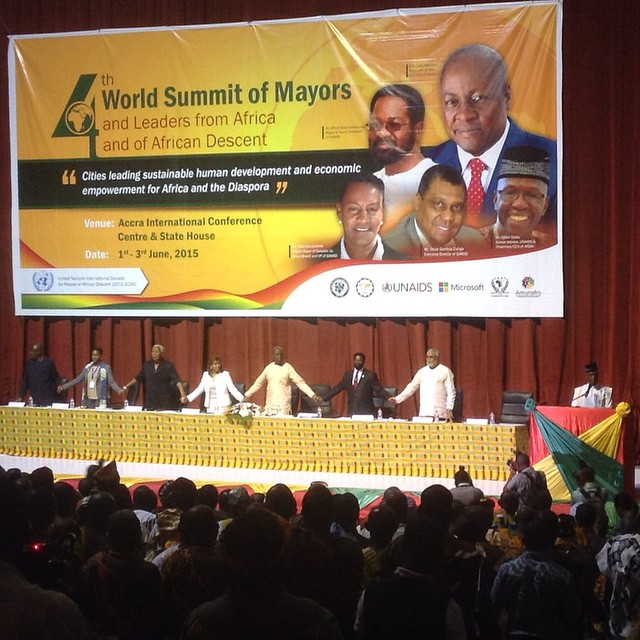An agreement to make Accra Africa’s first center of excellence in Microsoft Corp.’s CityNext initiative catapults the Ghanaian city into the limelight of a global effort to build technology-driven cities that meet the needs and challenges of rapid urbanization.
The agreement, signed in the run-up to the Fourth World Summit of Mayors and Leaders from Africa and of African Descent held this month in Accra, is a key outcome of the summit. Emphasizing sustainable human development and economic empowerment for Africa and its diaspora, the summit was organized by the Global Alliance of Mayors and Leaders from Africa and of African Descent through the African Renaissance and Diaspora Network (ARDN), its U.S.-based secretariat, in partnership with the City of Accra, Colombia’s National Association of Mayors of Municipalities with a Predominantly Afro-Descendant Population, and the Joint United Nations Program on HIV/AIDS.
“Mayors are the only ones ready to take risks,” said Simon Bradford, Microsoft’s cloud technologies director for the Middle East and Africa, public sector, speaking at the summit in Accra. “The Rockefeller Foundation committed $100 million to build urban resilience worldwide, resilience to disasters, violence, hunger and acute events. We’re trying to bring resilience-thinking to cities.”
The goal of the CityNext initiative is to turn 100 cities worldwide into more efficiently run, safer, healthier, people-focused centers, utilizing Microsoft’s Cloud, Big Data, mobile and social technologies. Accra, which at its independence in 1957 was 70 percent rural and now is more than 50 percent urbanized, also is one of four African cities selected to join the Rockefeller Foundation’s 100 Resilient Cities, along with Arusha (Tanzania), Enugu (Nigeria), and Kigali (Rwanda).
Under the agreement signed by Microsoft Ghana, the Accra Metropolitan Assembly, and the Global Alliance of Mayors and Leaders from Africa and of African Descent, Microsoft will provide an enabling cloud computing platform for the assembly, along with groundbreaking applications for tele-health evaluation, e-skills and digital literacy, and technical guidance to help Accra accelerate its cloud computing solutions as part of its e-citizen initiative to support the e-health program.
“The goal of this partnership is to drive both the adoption and success of this center of excellence in Accra, and then to use it as a case study to foster the development of other centers in the region and across the Global Alliance of Mayors,” said Djibril Diallo, Ph.D., ARDN’s chairman and chief executive officer, and seniro adviser to the executive director of UNAIDS.
More than 300 mayors attended the June 1-3 summit in Accra, including mayors from several cities in Africa, the Caribbean, Latin America and the United States. In their Summit Declaration, they pledged to:
* Develop a roadmap for urban and community leaders so that cities have greater opportunities to establish effective twinning agreements, identification of best practices, training programs for professional growth and development, a stronger AIDS response, public-private partnerships, promotion of women’s empowerment, youth development initiatives, and early childhood education and higher education programs
* Encourage more mayors to sign and implement the Paris Declaration to end the AIDS epidemic in their cities;
* Explore new funding mechanisms, such as innovative taxation, contributions from the private sector, and local municipality budget lines for healthcare, education and cultural purposes;
* Take advantage of educational, agricultural and research programs at Historically Black Colleges and Universities in the United States and established satellite institutions both online and on the ground in Africa;
* Work to broaden use of e-governance and digital technologies;
* Establish alliances between African universities and the National Association For Equal Opportunity in Higher Education (NAFEO)’s 150 member institutions to work towards sustainable human development and economic empowerment of Africa and the Diaspora;
* Create an environment conducive to promotion of youth education, soft skills training and entrepreneurship; and
* Create and strengthen programs to empower women and build services dedicated to assist women in low-income situations.













